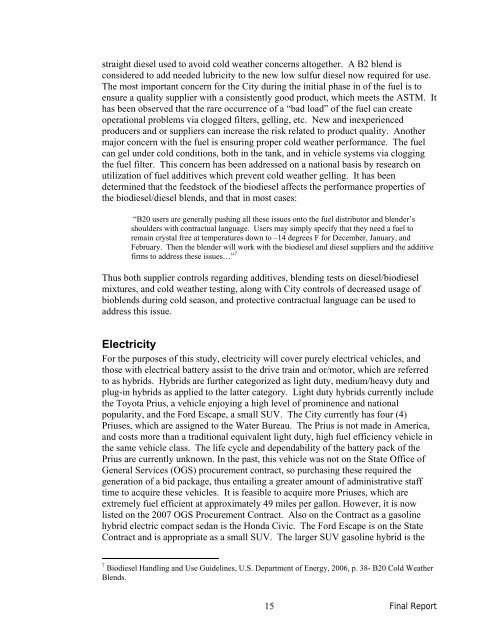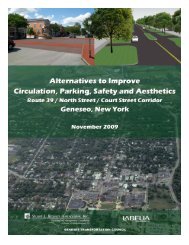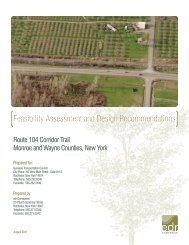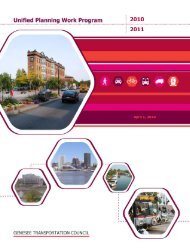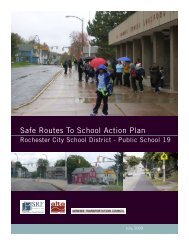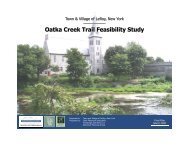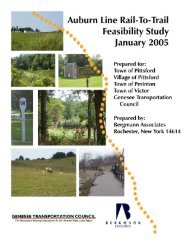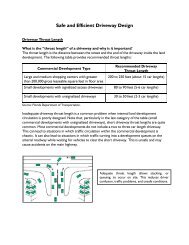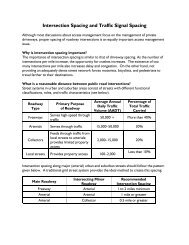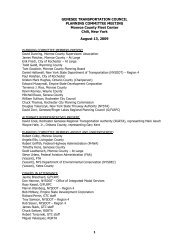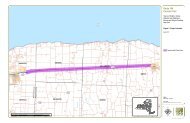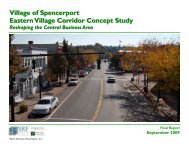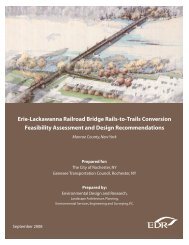Final Report Rochester Vehicle Fleet Alternative Fuels Systems Study
Final Report Rochester Vehicle Fleet Alternative Fuels Systems Study
Final Report Rochester Vehicle Fleet Alternative Fuels Systems Study
Create successful ePaper yourself
Turn your PDF publications into a flip-book with our unique Google optimized e-Paper software.
straight diesel used to avoid cold weather concerns altogether. A B2 blend is<br />
considered to add needed lubricity to the new low sulfur diesel now required for use.<br />
The most important concern for the City during the initial phase in of the fuel is to<br />
ensure a quality supplier with a consistently good product, which meets the ASTM. It<br />
has been observed that the rare occurrence of a “bad load” of the fuel can create<br />
operational problems via clogged filters, gelling, etc. New and inexperienced<br />
producers and or suppliers can increase the risk related to product quality. Another<br />
major concern with the fuel is ensuring proper cold weather performance. The fuel<br />
can gel under cold conditions, both in the tank, and in vehicle systems via clogging<br />
the fuel filter. This concern has been addressed on a national basis by research on<br />
utilization of fuel additives which prevent cold weather gelling. It has been<br />
determined that the feedstock of the biodiesel affects the performance properties of<br />
the biodiesel/diesel blends, and that in most cases:<br />
“B20 users are generally pushing all these issues onto the fuel distributor and blender’s<br />
shoulders with contractual language. Users may simply specify that they need a fuel to<br />
remain crystal free at temperatures down to –14 degrees F for December, January, and<br />
February. Then the blender will work with the biodiesel and diesel suppliers and the additive<br />
firms to address these issues…” 7<br />
Thus both supplier controls regarding additives, blending tests on diesel/biodiesel<br />
mixtures, and cold weather testing, along with City controls of decreased usage of<br />
bioblends during cold season, and protective contractual language can be used to<br />
address this issue.<br />
Electricity<br />
For the purposes of this study, electricity will cover purely electrical vehicles, and<br />
those with electrical battery assist to the drive train and or/motor, which are referred<br />
to as hybrids. Hybrids are further categorized as light duty, medium/heavy duty and<br />
plug-in hybrids as applied to the latter category. Light duty hybrids currently include<br />
the Toyota Prius, a vehicle enjoying a high level of prominence and national<br />
popularity, and the Ford Escape, a small SUV. The City currently has four (4)<br />
Priuses, which are assigned to the Water Bureau. The Prius is not made in America,<br />
and costs more than a traditional equivalent light duty, high fuel efficiency vehicle in<br />
the same vehicle class. The life cycle and dependability of the battery pack of the<br />
Prius are currently unknown. In the past, this vehicle was not on the State Office of<br />
General Services (OGS) procurement contract, so purchasing these required the<br />
generation of a bid package, thus entailing a greater amount of administrative staff<br />
time to acquire these vehicles. It is feasible to acquire more Priuses, which are<br />
extremely fuel efficient at approximately 49 miles per gallon. However, it is now<br />
listed on the 2007 OGS Procurement Contract. Also on the Contract as a gasoline<br />
hybrid electric compact sedan is the Honda Civic. The Ford Escape is on the State<br />
Contract and is appropriate as a small SUV. The larger SUV gasoline hybrid is the<br />
7 Biodiesel Handling and Use Guidelines, U.S. Department of Energy, 2006, p. 38- B20 Cold Weather<br />
Blends.<br />
15<br />
<strong>Final</strong> <strong>Report</strong>


